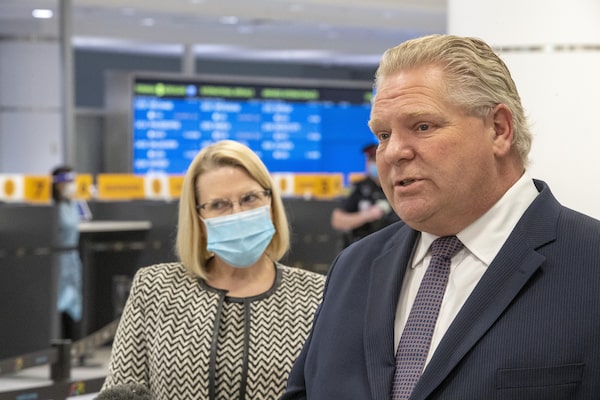
Ontario Premier Doug Ford, right, and Solicitor General Sylvia Jones answer questions after touring the COVID-19 testing centre in Terminal 3 at Pearson Airport in Toronto on Feb. 3, 2021. The commission overseeing the Emergencies Act inquiry says Ford and Jones cannot be compelled to testify because of their parliamentary privilege.Frank Gunn/The Canadian Press
Ontario Premier Doug Ford and his deputy premier, Sylvia Jones, won their legal challenge against testifying at the Emergencies Act inquiry and will not appear as witnesses at the commission studying the use of the federal power.
On Monday, the Federal Court ruled that while the two politicians “may have valuable evidence to offer,” they cannot be compelled to testify because they are invoking parliamentary privilege.
The Public Order Emergency Commission is studying the circumstances that led to the federal government taking the step to invoke the Emergencies Act. The move was done to end the anti-government, anti-vaccine-mandate blockades that gridlocked Ottawa and shut down several border crossings. Led by Justice Paul Rouleau, the inquiry must also determine whether the federal government followed the law when it invoked the act.
Mr. Ford supported Prime Minister Justin Trudeau’s invocation of the act in February and has repeated his support since then. The Premier said in June he would testify at the inquiry but then refused voluntary invitations to do so and ultimately fought a summons in court.
The summonses were issued for both Mr. Ford and Ms. Jones. The province challenged them in court, arguing that they should be quashed and also that the two elected officials could not be compelled to testify because they are protected by parliamentary privilege.
In a written ruling, Justice Simon Fothergill found that the summonses were valid but not enforceable “so long as the Premier and Minister continue to resist them by asserting parliamentary privilege.”
Justice Fothergill said that compelling Mr. Ford and Ms. Jones to testify in spite of “a valid claim of parliamentary privilege would impair and undermine the constitutional separation of powers.” Mr. Ford and Ms. Jones were scheduled to testify on Thursday. The judge noted that the Ontario legislature is not sitting this week and so neither politician would miss legislative work if they chose to waive privilege and voluntarily testify.
The commission will not appeal the decision. A statement from co-lead counsels Jeffrey Leon and Shantona Chaudhury said that given the short time frame that the commission is working under, “there are effectively no additional practical legal steps to take.”
Mr. Leon and Ms. Chaudhury reiterated their voluntary invitation to the Premier and Deputy Premier to testify.
Eight federal ministers, including Mr. Trudeau, have waived their parliamentary privilege and agreed to voluntarily testify. On Monday, the provincial NDP released a statement urging Mr. Ford and Ms. Jones to “stop hiding behind the flimsy excuse of parliamentary privilege.”
The statement from Ontario NDP MPPs Joel Harden and Lisa Gretzky said Mr. Ford “sat on his hands” while convoy protests upended the lives of people in Windsor and Ottawa. They said it remains an open question whether Mr. Trudeau would have needed to invoke the federal act if Ontario “had used its tools to put an end to the occupation.”
On Monday, Mr. Ford made clear he has no plans to testify, repeatedly stressing to reporters that the inquiry is about a federal decision.
“This is a federal inquiry about the federal government using the federal Emergencies Act. It’s not the province,” he said before the decision from the court was made public.
He was unable to explain when asked what “irreparable harm” would come if he did testify. Provincial lawyers told the court in arguments last week that the harm would be to the rule of law if parliamentary privilege is not upheld.
Ms. Jones was the province’s solicitor-general last winter when the Ottawa police service proved unable to respond to the protests that shuttered the capital city’s downtown core for more than three weeks. More than a week into the blockades in Ottawa, protesters also blockaded the Ambassador Bridge – the country’s most important border crossing with the U.S. However, that second blockade was cleared before the federal act was invoked.
Ontario has submitted hundreds of documents to the inquiry and two senior bureaucrats will also testify this week. However, commission lawyers said that the evidence they have received so far shows that only Mr. Ford and Ms. Jones can fill the gaps on some questions.
For example, the commission said it would like to know why the Premier supported the act’s invocation and if he did not believe that Windsor and Ottawa police could resolve the blockades relying solely on provincial powers. Policing falls under provincial jurisdiction.
A coalition of Ottawa residents and businesses has standing at the inquiry and was one of the parties that pushed for the Premier and Deputy Premier to testify. Bijon Roy argued on their behalf during the Nov. 1 hearing on the province’s case. In a statement on Monday he said “the Premier has never properly explained to Ottawa why he could not act sooner, or what steps he was considering to help.”
He said Ottawa residents “felt abandoned” during the more than three week blockade of the city and it would show “courtesy and respect” to Ottawa and the inquiry if Mr. Ford and Ms. Jones decided to appear and explain “their role in the troubling events of February 2022.”
As first reported by the Toronto Star, Mr. Ford was asked on June 30 why the province was not participating in the inquiry. The Premier replied “if they call me, I’ll participate.”